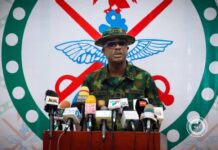Nigeria presently faces a learning poverty in which 70percent of 10year olds in basic schools are not learning.
UNICEF Chief of Field office Kano, Rahama Rohood Mohd Farah, made this known in Kano during a Two day media dialogue organised for Journalists by UNICEF on SDGs as Child Rights.
Rohood further called for increased funding to the education sector in Nigeria, especially allocation of adequate resources to pre-primary and primary level of education.
The UN Chief who decried the existing figure of 10.5m Out Of School children in Nigeria said with the additional 70percent who do not have literacy and numeracy skills, there is need for investment in improving teacher quality across the country.
Acknowledging that progress is currently being made, he stressed that alot still needs to be done to scale-up Foundational Literacy and Numeracy in Nigeria.
To address this challenge , the UNICEF Chief , stated that achieving basic foundational skills at the level of learning cannot be overemphasized.
Rahama Rohood further disclosed that already UNICEF is supporting the Government of Nigeria to improve Foundational Literacy and Numeracy through Teaching at the Right Level (TaRL) and Reading and Numeracy Activities (RANA).
“Education is a fundamental human right, which is well-articulated in the UN Convention on the Rights of the Child, which guides the work of UNICEF, and other legal instruments, including the Nigerian Constitution”
He tasked the Nigerian media to deploy it channels of communication to raise awareness on the learning crisis in Nigeria.
Speaking on the Sustainable Development Goals as Child Rights, Dr. Chidi Ezinwa, Enugu State University of Science and Technology, said that achievement of SDGs will remain a mirage unless and untill the rights of the children are filled.
According to him, a pure case of denial of the right of a child reveals that several rights are taken away from the children.
Ezinwa emphasised that the SDGs presents crucial opportunities to push for the rights of the child ,he added that promoting the rights of children will aid the achievement of the SDGs.
He established that Child Rights are entitlements of the child hence no right is more important than the other.
“Denial of one Child’s Right leads to the denial of other rights ,we must admit that the quality of children we have today determines the quality of future we have”.
UNICEF Communication Specialist, Dr Geoffrey Njoku,said the objectives of the media dialogue is to raise awareness on the need to revamp the system , specifically on the need to change curriculum at the basic education level as well as the need to train teachers at the same level.
Rahama Rohood Mohd Farah was represented by Elhadji Issakha Diop.






































![Nigerian Lady Loses Laptop, Other Items to Early Morning Robbers on Her Way to Work in Lagos [VIDEO] ](https://raye24reporters.com/wp-content/uploads/2022/02/lady-who-lost-valuables-to-thieves-100x70.jpg)


